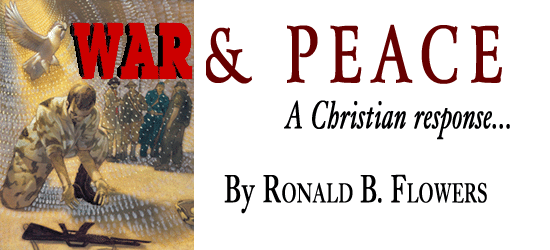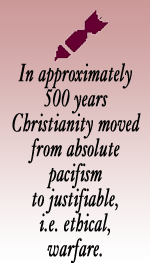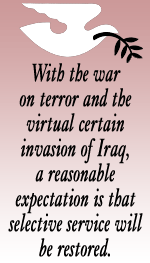War And Peace
Ronald B. Flowers March/April 2003
Getting your Trinity Audio player ready...

Illustrations by Sterling Hundley

War talk is fashionable again in America. President Bush has alerted the nation that he intends to be rid of Iraq as an irritant in the Near East. Congress has endorsed that intent. Armaments are stockpiled in the region.
The earliest Christians responded to such admonitions by not serving in the Roman military. Soldiers necessarily engaged in evil, including the requirement that soldiers worship the emperor as a Roman god. As monotheists and people charged to be peacemakers, Christians refused to be soldiers. But then some soldiers were converted to Christianity and, after about A. D. 170, Rome began to conscript Christians. Later, when Christianity became the official religion of the Roman Empire, Christians served in all ranks of the military. They now had the responsibility of protecting the empire from internal and external enemies. A new attitude toward war was required.3

But, with the advent of Protestantism, some "peace churches" emerged. Taking literally such biblical passages as those recounted earlier, these Christians made pacifism the centerpiece of their theology and morality. These were the Anabaptists (later called Mennonites, after one of their leaders, Menno Simons), the Church of the Brethren, and the Society of Friends (Quakers). The essence of their beliefs can be seen from this quote from the Anabaptists: "Jesus Christ has made us free from the servitude of the flesh and fit us for the service of God through the spirit which he has given us. Therefore we shall surely lay down the unchristian, yea, satanic weapons of force, such as sword, armor and the like, together with all their use, whether for the protection of friends or against personal enemies; and this in the strength of the words of Christ, 'I say unto you that ye resist not evil."5 These peace churches, joined in the nineteenth century by the Seventh-day Adventists and in the twentieth by the Jehovah's Witnesses, play a large role in American law on conscientious objection, to which we now turn.
In 1775 the Continental Congress issued a resolution calling upon everyone to respect the rights of nonresisters, but also appealed to conscientious objectors to support the cause of liberty however they could, consistently with their consciences. It was at this time that alternative service, i.e., service to the nation without fighting, was first introduced.6
The Civil War was the next major crisis for conscientious objectors—national conscription. The Confederacy initiated a draft first, (October 1862) but its law exempted members of peace churches provided they supplied substitutes to serve for them or paid a fee of 0. The Union Draft Act of February 1864 required pacifists to serve in the military in noncombatant roles, unless they paid a fee of 0 to stay out.7
When America entered World War I, the Draft Act of 1917 exempted members of peace churches from service: "Nothing in this act contained shall be construed to require or compel any person to serve in any of the forces herein provided for who is found to be a member of any well-recognized religious sect or organization at present organized and existing and whose existing creed or principles forbid its members to participate in war in any form and whose religious convictions are against war or participation therein in accordance with the creed or principles of said religious organizations."8 Previous opportunities to hire a substitute or pay a fee were eliminated from the law from this time forward.
Some attacked this law in the Supreme Court as violating the establishment and the free exercise clauses, because it preferred some religions over others. The Court brushed the claim aside: "We pass [it] without anything but statement . . . because we think its unsoundness is too apparent to require us to do more."9
With world war threatening in 1940, Congress modified the conscription laws and broadened the category of who could qualify for conscientious objection. "Nothing contained in this act shall be construed to require any person to be subject to combatant training and service in the land or naval forces of the United States who, by reason of religious training and belief, is conscientiously opposed to participation in war in any form."10Religious people of any faith could qualify, but nonreligious people could not. This change was urged on Congress by religious groups, both historic peace churches and others.11
The 1940 act did not define "religious training and belief." Soon people who were not members of religious organizations and who seemed not to be religious were in court seeking conscientious objector status. Courts disagreed on how religious a person should be to qualify under the "religious training and belief" language.12 With courts in disarray, Congress rewrote the law in 1948: "Nothing contained in this title shall be construed to require any person to be subject to combatant training and service in the armed forces of the United States who, by reason of religious training and belief, is conscientiously opposed to participating in war in any form. Religious training and belief in this connection means an individual's belief in a relation to a Supreme Being involving duties superior to those arising from any human relation, but does not include essentially political, sociological, or philosophical views or a merely personal moral code."13

During the Vietnam War the definition of "religious training and belief" was challenged by people with unconventional religious beliefs; they did not believe in a personal God. The Supreme Court held that they qualified as conscientious objectors anyway. That Congress used the phrase "Supreme Being" rather than "God" suggested it envisioned an expansive interpretation of "religious training and belief." The Court developed what I call a "double sincerity test" for deciding if one qualified as a conscientious objector. "A sincere and meaningful belief which occupies in the life of its possessor a place parallel to that filled by the God of those admittedly qualifying for the exemption comes within the statutory definition."14 With this elastic interpretation of the statute, virtually anyone could qualify. It was probably with that in mind that Congress wrote, in 1967, a version of the draft law that excised any reference to a Supreme Being: "Nothing contained in this title shall be construed to require any person to be subject to combatant training and service in the armed forces of the United States who, by reason of religious training and belief, is conscientiously opposed to war in any form. As used in this subsection, the term 'religious training and belief' does not include essentially political, sociological or philosophical views, or a merely personal moral code."15
Every one of these statutes from 1917 until the most recent in 1967 requires a conscientious objector to object to participation in war "in any form." This excluded any person who wanted to select which wars in which to fight. This was challenged during the Vietnam War by some who thought that war immoral, although they could conceive of fighting in other wars, such as defensive wars like World War II. The Supreme Court held that the statute would not allow that. Furthermore, because the statute was written in a religion-neutral way, it did not violate the establishment clause by favoring absolute pacifists over those who were selective objectors.16
This brief survey of exemptions for conscientious objectors in America's laws presupposes the existence of the draft. Since 1973 we have had an all-volunteer military. But, with the war on terror and the virtual certain invasion of Iraq, a reasonable expectation is that selective service will be restored. It is also reasonable to assume that the provisions for conscientious objectors will be reinstated—unless Congress does something different. That will depend upon the national mood about those who have conscientious objections to military service. And that will depend upon the national memory of huge numbers of military-age people who fled to Canada during Vietnam. All of this will bear watching as war clouds gather.

Ronald B. Flowers was for many years the John F. Weatherly professor of religion at Texas Christian University. A longtime contributor to Liberty, he writes from Fort Worth, Texas.
1 Matthew 5:5, 9, 39, 44, NRSV.*
2 Romans 12:14, 17, 18, 21, NRSV.
3 Knut Willem Ruyter, "Pacifism and Military Service in the Early Church," Cross Currents 32 (Spring 1982): 54-60; Roland Bainton, Christian Attitudes Toward War and Peace: A Historical Survey and Critical Reevaluation (Nashville: Abingdon Press, 1960), pp. 66-84.
4 Bainton, pp. 91-100. Characteristics of just war are: (1) it must have a justifiable cause, such as self-defense; (2) it must be declared by the highest possible authority, those accountable to the warring nation; (3) it should be a last resort, only after all other means of conflict resolution have failed; (4) proportionality, the evil that war inflicts should not be greater than the evil that it opposes; (5) there must be a reasonable chance of success; it must have as its goal a durable and moral peace. Joseph A. Allen, War: A Primer for Christians (Nashville: Abingdon Press, 1999), pp. 31-52; Edward LeRoy Long, Jr.,
War and Conscience in America (Philadelphia: Westminster Press, 1968), pp. 22-33.
5 Schleitheim Confession of Faith, 1527, quoted in John Horsch, The Principle of Nonresistance as Held by the Mennonite Church (Scottdale, Pa: Mennonite Publishing House, 1951), pp. 8, 9.
6 John Whiteclay Chambers II, "Conscientious Objectors and the American State From Colonial Times to the Present," in The New Conscientious Objection: From Sacred to Secular Resistance,
ed. Charles C. Moskos and John Whiteclay Chambers II (New York: Oxford University
Press, 1993), pp. 23-28; Conscientious Objection (Washington, D.C.: Selective Service System, special monograph 11, 1950), vol. 1, pp. 33-38.
7 Confederate States of America, Statutes at Large (Feb. 1861-Feb. 1864), chap. 45, p. 78; 13 Statutes at Large 6 (1864); Conscientious Objection, vol. 1, pp. 41-45.
8 40 Statutes at Large 76 at 78